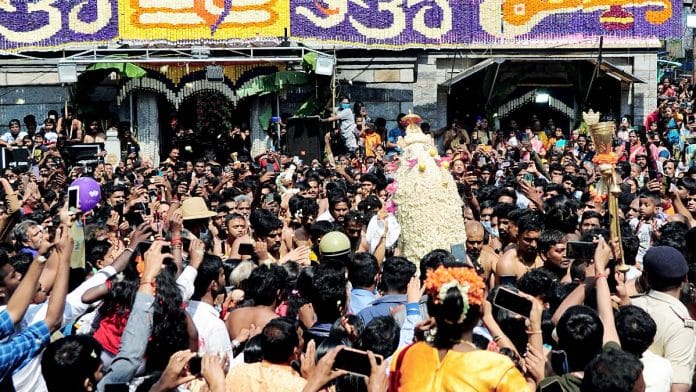Bengaluru: At a time when growing religious intolerance in Karnataka — be it in the form of reactions against the hijab ban protests or calls to boycott businesses owned by Muslims at temple fairs — are grabbing eyeballs, a handful of religious institutions in the state are ensuring that they hold on to their syncretic traditions.
These include the Chennakeshava Temple in the state’s Belur town, as well as the organisers of Karaga — a 300-year-old temple fair — in Bengaluru. In both instances, the Hindu and Muslim communities defied the tensions of recent months to come together in celebration of centuries-old traditions.
On Wednesday, as hundreds of devout Hindus gathered to pray to Lord Vishnu at the Chennakeshava Temple, dozens of priests performed rituals according to the Agama (traditional Hindu scriptures), and the decked-up chariot of Chennakeshava (a form of Vishnu) rolled off, marking the beginning of the Rathotsava (chariot festival).
All through, Maulvi Syed Sajjad Khaji, a cleric from the Doddamedur Masjid in Hassan district, stood on a small platform next to the wheels of the chariot. A green cloth wrapped around his head, Khaji read out verses from the Quran.
A similar sight was witnessed earlier this month as the Karaga was held in full fervour after two years of Covid-related restrictions.
The Karaga — an earthen pot filled with water, adorned with flowers in a conical shape and balanced on a bearer’s head, which is considered a divine embodiment of Draupadi as Adi Shakti — halted at the dargah of Hazrat Tawakkal Mastan Baba.
On the eve of the Karaga festivities, that began on 8 April, a team of priests from the Dharmaraya Swamy temple — which is at the heart of the Karaga celebrations — visited the Hazrat Tawakkal Mastan Dargah, by invitation from the dargah’s Muslim clerics.
The celebration also saw devotees from both communities exchange greetings and prayers, holding out hope of unity amid the ongoing incidents of religious differences in the state.
The decision by the organisers to uphold the fair’s syncretic tradition came despite alleged appeals by Hindutva workers to skip the dargah halt. Similar claims were made by S. Krishnaswamy Bhattar, the chief priest at the Chennakeshava Temple.
But both described the traditions of inter-faith unity as crucial.
Bhattar described the Chennakeshava Temple’s tradition as “Sarva Dharma Samabhava” or equal respect for all religions and peaceful co-existence of all faiths.
The temple is believed to be 900 years old and its syncretic tradition dates back centuries as well.
“It’s a centuries-old tradition. One that finds its roots in Sri Ramanujacharya’s Vishishtadvaita (a school of Vedanta philosophy), that preaches equality to all in the path of spirituality, belief and salvation,” Bhattar told The Print.
“It is in the path that he laid, that we continue, allowing Muslims to participate in the festival as a part of that inclusive tradition,” he added.
Congress MLC P. R. Ramesh, a leader from the Tigala community, which organises the Karaga, was quoted as saying in the media that “the Sufi (Hazrat Tawakkal Mastan Baba) was a great devotee of our family Goddess Draupadi Devi”.
“He had wished that after his passing away, he would wish to see her every year. Accordingly, the procession stays at the dargah for some time on the concluding day of the ceremony,” he added.
Also read: ‘Road-rage murder’ gets communal twist: Why Karnataka Police fact-checked home minister & others
‘A bid to unite all people’
Bhattar said the members of “a few (Hindutva) organisations had approached us a few weeks ago, asking us not to allow reading of Quranic verses”.
“We had to seek the (the government’s) endowment department’s opinion on it. After perusing the temple’s handbook, the department permitted us to go ahead with the tradition,” he added.
Like many old temples in the state, the Chennakeshava temple is also under the administrative control of the Karnataka government, under the Hindu Religious and Charitable Institutions and Endowments (or Muzrai) Department.
The temple handbook is a manual dating back to 1932, codifying all practices, rituals, traditions intrinsic to the Chennakeshava temple, as recognised and approved by the erstwhile Mysore State administration.
“The manual details all traditional and historical practices that have been followed in the temple. The tradition of reading verses from the Quran, too, is codified in the manual,” K. Vidyulatha, executive officer of the Chennakeshava temple, told The Print
She added: “It is said Sri Ramanujacharya, in a bid to unite all people, gave opportunity to people from all sects and communities to offer prayers to the deity. That has continued to date.”
Vidyulatha claimed that her office had received demands from Hindutva groups that non-Hindu vendors not be allowed at the temple fair.
“The rule disallowing non-Hindus from setting up businesses only applies to properties owned by the temple. We asked for non-Hindu vendors to stay away, but it doesn’t extend to properties not under the temple’s ownership and hence non-Hindus were allowed to set up shops outside the temple,” she added.
Another example of religious syncretism in Karnataka is the Baba Budangiri cave shrines — often referred to as the ‘Ayodhya of the South’ by Hindutva leaders — which are a revered pilgrimage spot for both Hindus and Muslims.
Also known as the ‘Shri Guru Dattatreya Swamy Baba Budan Dargah’, the name of the shrine itself indicates its syncretic identity.
Guru Dattatreya, a Hindu deity believed to be an incarnation of the Trimurti — Shiva, Vishnu, and Brahma as one being — is revered here, alongside both Baba Budan, a 16th-century Sufi saint who is believed to have introduced the coffee plant to India, and Dada Hayat, an 11th-century Sufi saint.
(Edited by Poulomi Banerjee)






